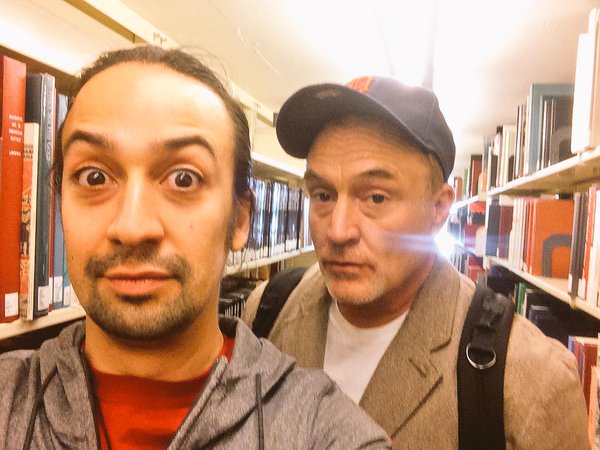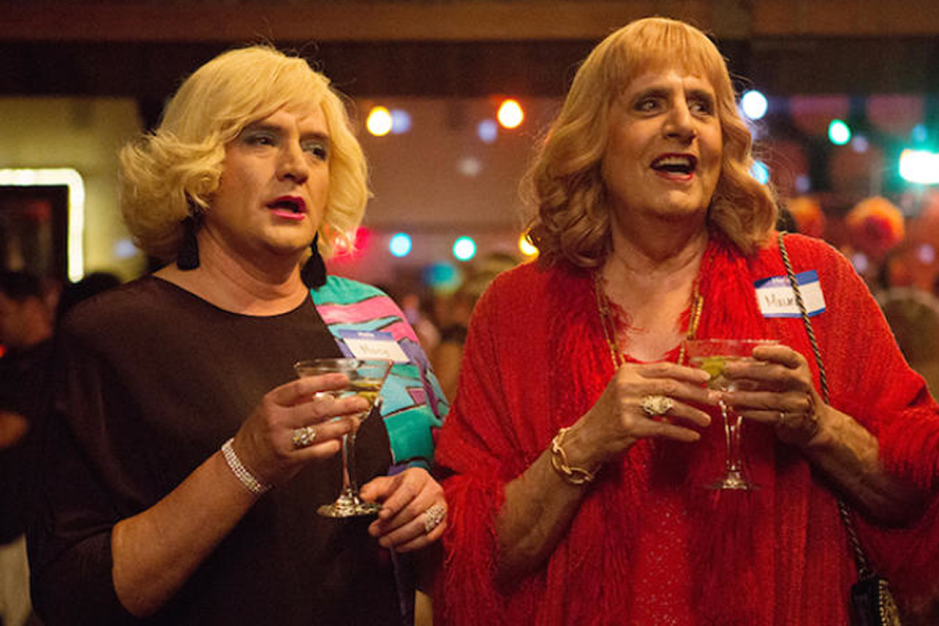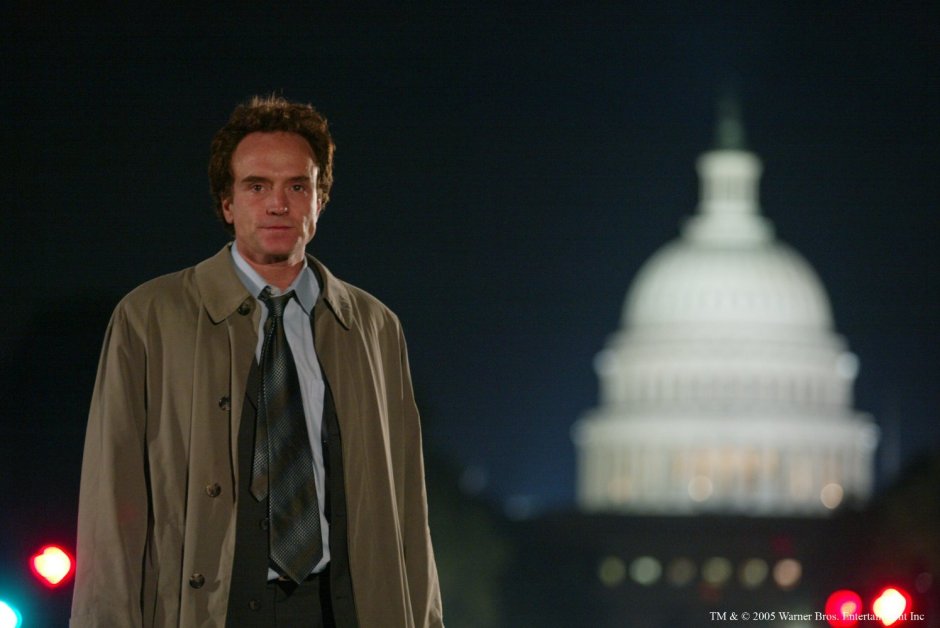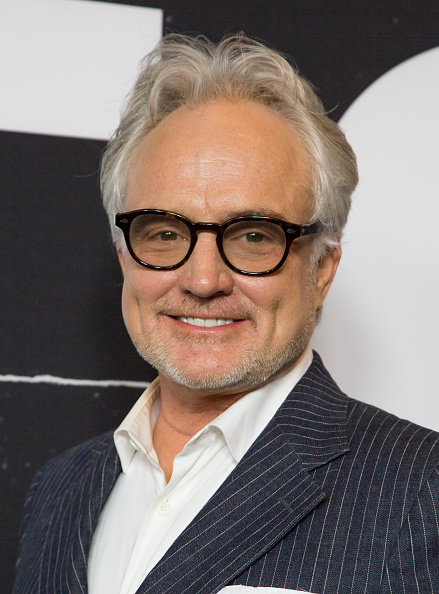Looking at Bradley Whitford’s body of work feels like being a kid in a candy store. Where to begin? Everything is so damn good. There’s The West Wing of course–that’s a no brainer. But what about Transparent where he gave one of the most stunning performances I’ve ever seen on television? And then there’s the movie we’re all currently talking about: Get Out, Jordan Peele’s satirical horror film that is topping the box office thanks, in part, to Whitford’s terrifying performance. But there’s also so much more. So instead of digging into the many, many brilliant performances he’s given throughout his career–and to avoid Get Out spoilers that everyone is trying so hard to sheild themselves from–in this conversation, Whitford goes in-depth about acting. He offers his insights into training, how to be a well-rounded storyteller, the importance of theatrical experience, and why Lin-Manuel Miranda and Tommy Kail are the “marvels of 21st Century Theater.” It’s an interview with a lot of Wesleyan love, a lot of hard truths, and a lot of advice to help you achieve your goals.
When did you catch the acting bug?
Well, I’ll tell you: I did an anti-smoking skit in 6th grade. I saw my brother in a play in 7th grade. Probably the best acting I ever did was playing Teddy Roosevelt [as a kid]. I lived partially in Philadelphia and also in Wisconsin, where I went to high school. Growing up in Wisconsin, it’s not like growing up in New York, LA, or Philly where somebody’s cousin was in a movie or somebody became an actor. Becoming an actor, it never occurred to me that I would pursue it. I would not say it out loud. I didn’t say it out loud even when I was at Wesleyan. I was basically an English major, but was in play after play. It was what I loved to do. I eventually became a Theater major, but I still didn’t think this was a reasonable thing to pursue. Then my senior year I applied to Yale [School of Drama] and Juilliard. I got waitlisted at Yale and got accepted to Juilliard. I remember when I was opening the letter realizing, “Oh my God! I guess this means you’re going to try to be an actor.” So then I went to Juilliard for four years. I told my dad it was “med school with guaranteed unemployment at the end.”
I was thinking about Tommy Kail and Lin [Manuel] Miranda—I don’t know if you’ve heard of him.
What’d he do again?
Oh yeah, what did he do? Anyway, Tommy and Lin are fantastic examples of something that is particularly Wesleyan. I have kids. There is this notion that you should know what you want to do and be pursuing exactly that. It happens really early on than it did during my generation. To get a creature like Tommy Kail—I don’t think he ever took a theater class, but was a Wesleyan kid who had eclectic interests and was at a place like Wesleyan that encourages cross pollination. The most amazing thing to me about Lin—and the thing that makes me proudest about Wesleyan—is that here’s this guy who’s obsessed with theater and making music, sees this doorstopper of a historical biography, and picks it up. Incredible. That’s not career tunnel vision. He reads the first chapter, comes in weeping, sees a connection, like “Oh this guy’s Tupac.”
It’s weird because I really advocate, especially in this time, for arts education. But premature specialization is crazy. I went to Juilliard and I was thrilled. But you know Juilliard’s a trade school. The other great thing about Wesleyan and the reason they have produced the marvels of 21st Century Theater, Lin and Tommy, is because it wasn’t an overly structured professional program. There’s something about Wesleyan—and the same thing happens in the Film Department—proportionally it is insane how many professional storytellers there are who were Film majors from this tiny school. It’s because Wesleyan is a place that seems to stimulate initiative. That’s what gives you really interesting people.

When I went to Juilliard there was a guy—he was not in my year—who I knew from Wesleyan. We worked in the same restaurant. He came in one day depressed because his dad who was some kind of professional wanted him to go to law school. He had been out of Wesleyan and was like, “Nah, I don’t want to go to law school.” The dad said, “Med school? Grad school? You were a good student. Is there anything you want to do.” And he’s like, “No.” It was terrible because his father wasn’t a prick, he was this really sweet guy. He said, “I know you don’t want to be a waiter, so what do you want to do?” And the guy said, “You don’t want to hear this.” And the dad said, “No. I love you. Tell me what you want to do.” He said, “I love playing the drums, but I don’t want to be a musician. I love performing but I don’t want to be an actor—that’s stupid. I’m interested in art. I majored in Art History, but I don’t want to go to grad school for that.” So the dad asks, “What do you want to do?” And he says what no parent should ever hear; he says, “I really want to be a performance artist,” which is worse than someone saying they want to be a comedian because as a parent, you know it’s going to be a tough road. Anyway, he is the guy who created Blue Man Group: Chris Wink. It’s another great example of what I think is a peculiar impulse that’s so Wesleyan. Having been on the board there recently I think that’s really intact, which makes me happy.
But for all of those kids who are walking around like, “Oh God, I should know exactly what I’m doing.” I’m not telling you to be directionless. I’m saying, listen to the whispers in your head but take advantage of all the exploration you can do there. I got pretentious again!
No, this is great! How did your Juilliard training help set you up for success?
Here’s the thing about acting: if you want to be a dancer, if you want to play the trumpet, if you want to sing opera, there’s a mountain of technique [you can master]. I have seen dogs be good in movies [Bradley laughs]. Acting is a different beast. There are probably three sentences we can all agree on in terms of acting technique. But it is not a thing where with some sequential absorption of technique you’re necessarily going to be any good at it. It’s like writing. It’s weird at Juilliard because everyone else in some way is tackling a much more tangible thing to attack. The greatest thing about Juilliard is instead of spending 90% of my day supporting myself at a restaurant and 10% of my day acting, I went into that spending 95% of my day acting. With anything it really is experience. It really is doing it. I was very lucky to be put in a situation where I could just act a lot. At Juilliard, they’ll say, “Well, we have this very brilliantly mapped out program. They learn this and that now.” That’s all bullshit I think. It’s just experience. When it comes to acting or writing, you just need to do it. You have to get yourself to. Don’t feel shame because it’s hard to do it alone. Acting you cannot do alone. It’s hard to get hired. Writing is also very hard to do alone. But you have to get yourself in a structure that will demand it of you. I think a place like Juilliard in terms of acting, to me—you know, I have some experience with depression and therapy in my life. I can tell you that when you go to a shrink and it’s helpful, 90% of it is the act of doing it. It’s not the particular brilliance of the shrink. At Juilliard I just got to act a lot. In an acting school, you get a much wider range of casting. If you’re just a young person in New York, you are whatever you are. No commercial world wants you to stretch your wings. So it was a really good experience.
I just had a fascinating experience…at [my] Juilliard [reunion]. For my group, they took about 25 people and I think about 19 of us graduated. We were Group 14. We just had our 31st—incredible—reunion. It was interesting. Back then about half of us had gone to college. There were some people who came in there at 17. A lot of them felt—and I understand this—that premature specialization and the crazy pressure of a place like Juilliard was not healthy for them. Some of them have very strong feelings of anger about it. If you look at how many of us are making a living acting—this is after 4 years of Juilliard—it’s four or five of us. None of them are women. Partially because—I think this is now changing—but these people started their career where every movie you’d go in on, there’d be a large range of men, a wife, and a babe. I think that’s changing. It was very interesting to be back there with this group [Bradley laughs].
How else has the industry changed since you first started? What do you wish you were seeing more of?
The business is completely different from when I was doing West Wing. First of all, West Wing you could never do as a network show anymore. You just couldn’t do it on a network economically because we could get 20 million people to watch. Now there are so many different ways to do shows that I think by in large it’s an incredible time in television. You know, I’ve worked on Transparent. There are venues for shows to get stories out there. It’s just incredible if you compare it to 10 or 15 years ago.

At the same time, it’s very hard to launch a show. With this wonderful democratization of storytelling, you no longer have to go through three or four networks—five if you count HBO. Now there are 40 different places where you can pitch a show. It’s also hard to make a show land in terms of an audience: land commercially, land culturally. There are a lot of opportunities out there.
I think Wesleyan kids tend to be really good at this—have an aspiration to write. Let me tell you, Hollywood eats paper. Yes, it’s incredibly hard to get a movie made. Yes, it’s incredibly hard. But if you can write or have the inclination to write and can get yourself to a place where you can actually put a period on the end of a script or two, I think there’s never been a time in history where the door to having a storytelling career has been more open. That’s good news.
And thank God things are really changing in terms of opportunity for women, minorities, communities that weren’t represented before. That really does feel like is changing, which is good.
I read in an interview that you said The West Wing worked because it was a bunch of theater actors. Can you talk about how theatrical experience helped shape the show and its quality, as well as other work you’ve done for the screen?
I can’t imagine being able to do the work I’ve been able to on television and film, if I didn’t start out onstage. I would feel like I had no bones. I wouldn’t know what I was doing. Being an actor is being a pawn in storytelling. If you’re doing a play you’re telling the entire story start to finish eight times a week. If you’re doing a movie or television thing, you’re doing it once in snippets out of sequence. I can’t imagine what it’s like to act on film without having years of knowing what a whole story feels like in your body. Anybody who wants to be an actor, you need to just do it a lot. You need to find a way to do it a lot. If you’re not getting work, you need to be in a scene study class because that’s how you get better.

Somebody like Allison Janney—how do you get Allison Janney? You have somebody who has a passion to do this, obviously has really good instincts, and you don’t let her be famous for 10 years. You make her do play, after play, after play eight times a week for a decade. Then she walks on TV and that’s what you get. You have to have that experience. I think about Mary Louise Parker who is an amazing, amazing actress. Her talent does not exist in an abstraction when she’s 18 years old. Her talent is a result of acting continuously. Your talent doesn’t exist independent of you doing it. I think people walk around wondering if they’re talented and think that will carry them, but you can’t understand whether or not you are talented if you don’t do it for 10,000 goddamn hours [Bradley laughs].
There’s a lot of stuff you do on film and TV that doesn’t have a technical demand. You’re just you. For actors, it’s really good to do both. Doing stage stuff makes you audacious. Doing film, you cannot lie—that’s the basic thing. The key to acting on film is: don’t. Aaron [Sorkin] is this weird, hybrid kind of writing. There’s a rhythm to it, there’s a style, there’s a technical demand that you have to meet. There’s clearly a rhythm to this writing. Aaron’s actually obsessed with musical theater. There’s literally a rhythm in the scenes. You can’t play a rhythm, but you have to be aware of it and alive in it. I think that if you’ve only done film you wouldn’t be able to do that. Again, not that you play a rhythm or play a style. But being able to play a scene while fulfilling a technical demand is something that requires theatrical experience.
What’s your advice for aspiring actors?
Honestly, this business is treacherous. I think people weirdly—and I’ve done this to myself, which I don’t like—you get some success as an actor and then you go, “I’m an actor. That’s what I am.” I’m actually interested in other things. I realize that what I am is a storyteller. I want to be a part of storytelling. That’s what I want to do. The odds are really tough. It’s a weird thing because I encourage absolutely everybody to pursue their passion. Do I have friends in their late 50s who could have produced West Wing but focused on being an actor and are almost 60 and stand-ins on a show and not very happy? Yeah, I do. The main thing if you want to be an actor is you need to be acting as much as possible. If you have any inclination to write, I strongly advise it.
It’s a very strange impulse to want to be an actor. A very small percentage of humanity goes to a Broadway play and sees somebody making a spectacle out of themselves and goes, “Oh I want to do that.” It’s a very assertive part of you. The hardest thing about being an actor is that there’s this assertive side of you that’s rendered totally passive by the business. That’s not healthy, it’s corrosive, it’s why actors become alcoholics [Bradley laughs]. You are at the mercy of someone writing a play, somebody deciding to produce it, somebody willing to cast you.
Here’s a clip of Bradley Whitford in his newest film, Get Out, now playing nationwide.
So, first of all, you need to act as much as possible. You need to generate your own stories. What’s a good example of a Wesleyan kid doing that? I don’t know?! Lin! This is a warning to all the actors out there: if Lin had auditioned and got into Juilliard, Lin would be doing a guest shot on Chicago Med as Dr. Fernandez and he’d be happy about it. Think about it. I’m telling you, it is my life’s struggle—and I’ve been able to write and direct—I don’t care if you’re the most successful actor on the planet. I want you to be involved in storytelling and actively involved in it. There’s something unhealthy about just being an actor [Bradley laughs]. Ugh, I sound so dark!
It’s a weird thing because the activity of acting is the most wonderful. When I fell in love with acting it was an epiphany to me: “This is the first fully synthesized thing I have ever done in my life. When I’m playing spots I have to turn off my heart and my brain. When I’m doing math I have to turn off my heart and my body. This is everything.” It was this really corny, huge epiphany and I still feel that way about acting. It’s incredibly powerful, empathetic, a total use of somebody. But the business is horrible [Bradley laughs]. I want all young actors to know the only way to get around that is to be actively involved in generating your own stories. ♦
